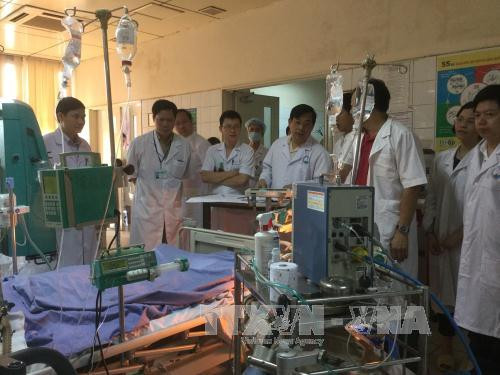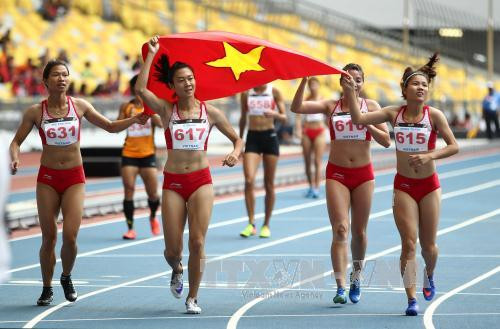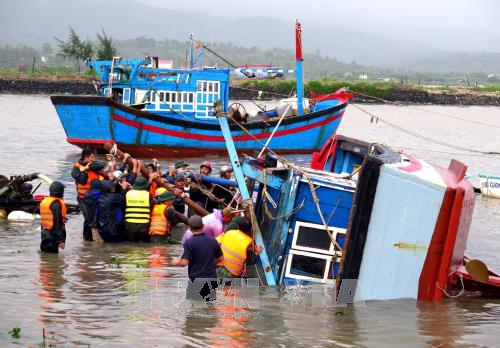1.Overcoming difficulties to fulfill all 13 socio-economic criteria
For the first time in years, Vietnam completed andsurpassed all 13 socio-economic targets set by the National Assembly. The macroeconomy was stable, inflation was under control, while the State budgetcollection and major economic indicators met requirements. Gross domesticproduct (GDP) expanded by 6.81 percent whilst export revenue exceeded 213.77billion USD, up 21.1 percent from the previous year. The country attracted almost 36 billion USD in foreign directinvestment (FDI), welcomed around 13 million international tourists and saw over120,000 new businesses established. Such outcomes created favourable momentumfor the country to push ahead with development and implement the Resolutionadopted at the 12th Congress of the Communist Party of Vietnam (CPV).
2.APEC 2017: Promoting regional cooperation, enhancing Vietnam’s position
With the theme “Creating New Dynamism, Fostering aShared Future”, APEC Vietnam Year 2017 was a comprehensive success in bothbilateral and multilateral aspects. Major orientations were mapped out topropel economic cooperation in Asia-Pacific forward and further deepencollaborative relations between Vietnam and other APEC member economies as wellas enhance the country’s position in the global arena.
3.Handling many complicated corruption cases
In 2017, several serious, complicated economic andcorruption cases were handled, such as the Oceanbank case involving Ha VanTham and his 50 accomplices and the case of Chau Thi Thu Nga and her nineaccomplices occurred at Housing Group, the dismissal of Dinh La Thang from the Politburo, and the suspension of the NA deputy status, legal proceedingsagainst and arrest of Thang, investigating wrongdoings relating to many leadersof the Vietnam Oil and Gas Group, forcing organisations and individuals involved to bearresponsibility before the law. Handling high-ranking officials, incumbent orretired, demonstrated there is no “prohibited zone” in the fight againstcorruption, and affirmed the determination of the whole political system andsociety to combat corruption and negative phenomena.
4. Promulgating a Resolution defining the crucial role of the private economicsector
On June 3, 2017, General Secretary of the CommunistParty of Vietnam (CPV) Nguyen Phu Trong signed into effect Resolution 10-NQ/TWon developing the private economic sector into an important driving force ofthe socialist-oriented market economy. On October 3, the Government issuedResolution 98/NQ-CP promulgating the Government’s action programme to implementthe Party resolution. Accordingly, the State will remove all barriers and prejudice,create favourable conditions for the private economic sector to develop in ahealthy, effective and sustainable manner. Vietnam aims to have at least 1million firms by 2020, over 1.5 million by 2025, and at least 2 million by2030. The private economic sector is expected to contribute about 50 percent,55 percent and 60-65 percent to the gross domestic product (GDP) in 2020, 2025and 2030, respectively.
5.Some BOT transport projects become hot button issue
In 2017, shortcomings in some build-operate-transfer(BOT) transport projects attracted public attention, despite the fact that thepolicy of developing transport infrastructure in the BOT form is a right moveand many BOT projects contributed to improving transport infrastructure anddeveloping the economy in some localities. At some BOT toll stations, manydrivers and local residents objected to paying fees, causing traffic jams, andforcing investors to allow vehicles to pass through the booths without feecollection. Prime Minister Nguyen Xuan Phuc urged responsible agencies tostrictly address the problems and legal violations while revising inappropriateprocedures.
6.Resolution on streamlining the political system comes into life
Resolution 18-NQ/TW on reforming and reorganising theapparatus of the political system towards effective and efficient operationdated on October 25, 2017 has been carried out widely, creating initial changesin streamlining the organisation of the apparatus; recruiting, appointing andpromoting officials; and accelerating decentralisation and administrativereform. The Communist Party of Vietnam Central Committee agreed to terminatethe operation of the North West, Central Highlands, and South West SteeringCommittees. The National Assembly, and the People’s Councils of some cities andprovinces promulgated resolutions, putting forth concrete measures to implementthe policy.
7.Health sector faces dengue fever epidemic, serious medical incidents
 The death of eight kidney dialysis patients in northern Hoa Binh province is among serious medical incidents in 2017.
The death of eight kidney dialysis patients in northern Hoa Binh province is among serious medical incidents in 2017.(Photo: VNA)
In 2017, dengue fever broke out and spread across 63cities and provinces with 163,600 cases, including 138,327 patients hospitalisedand 30 fatalities. Also, the health sector encountered serious medicalincidents such as the death of eight kidney dialysis patients in northern HoaBinh province and four infants in northern Bac Ninh province, and violations inthe management of medicine prices and use of cancer drugs. Those incidentsrequired the health sector to look for effective measures to prevent diseasesand improve management.
8.Vietnam’s sport affirms position in regional, global arenas
 Vietnam's track and field athletes triumphed in 4x100 metre relay category at SEA Games 29 in Malaysia(Photo: VNA)
Vietnam's track and field athletes triumphed in 4x100 metre relay category at SEA Games 29 in Malaysia(Photo: VNA)Vietnamese athletes ranked third with 58 gold, 50silver and 60 bronze medals at the 29th Southeast Asian Games (SEA Games 29) inMalaysia on August 19-31. Track-and-field athletes won big with 17 gold medals withswimmers alone claiming 10 gold medals.
Weightlifter Le Van Cong secured a gold medal at the2017 World Para Powerlifting Championships in Mexico, breaking the world recordof his own at the 49kg men’s category and becoming the top disabled athlete inthe history of Vietnamese sport with a collection of gold medals at Paralympic,world, Asia and Southeast Asia tournaments.
9.Storm Damrey kills 107 people, causes economic losses of about 22 trillion VND
 Border guards in Phu Yen province help fishermen in Song Cau town rescue a fishing vessel shunk in storm Damrey.
Border guards in Phu Yen province help fishermen in Song Cau town rescue a fishing vessel shunk in storm Damrey.(Photo: VNA)
Storm Damrey, the strongest storm hitting Vietnam inyears, suddenly landed on the south central coast of Vietnam, leaving 107people dead, 16 unaccounted for, 342 injured and damaging 165,000 houses. TheMinistry of Agriculture and Rural Development estimated that the storm causedeconomic losses of about 22 trillion VND (nearly one billion USD).
In 2017, Vietnam suffered 16 storms with severe humanand material losses (375 dead and missing, 636 injured and nearly 51.6 trillionVND of economic loss).
10.Two more heritage elements honoured by UNESCO
 “Xoan singing” was transferred from the UNESCO’s List of Intangible Cultural Heritage in Need of Urgent Safeguarding to the Representative List of the Intangible Cultural Heritage of Humanity.
“Xoan singing” was transferred from the UNESCO’s List of Intangible Cultural Heritage in Need of Urgent Safeguarding to the Representative List of the Intangible Cultural Heritage of Humanity.(Photo: VNA)
On December 7-8, 2017, at the 12th session of theUNESCO Inter-governmental Committee for the Safeguarding of the IntangibleCultural Heritage in Jeju, the Republic of Korea, UNESCO added Vietnam’s “xoan”singing in northern Phu Tho province and “bai choi” singing in the centralregion into the Representative List of the Intangible CulturalHeritage of Humanity. “Xoan singing” was transferred from the UNESCO’s List ofIntangible Cultural Heritage in Need of Urgent Safeguarding to theRepresentative List of the Intangible Cultural Heritage of Humanity thanks to greatefforts to preserve this heritage over the past six years.-VNA



































